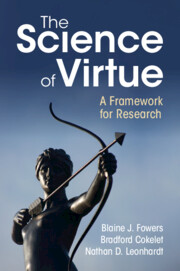Book contents
- The Science of Virtue
- The Science of Virtue
- Copyright page
- Contents
- Acknowledgments
- Introduction
- Part I Philosophical Resources and Prospects
- Part II Psychological Resources and Prospects
- Chapter 3 Toward Reconciling the Fragmentation of Virtue Science
- Chapter 4 Moral Development and Virtue
- Chapter 5 Personality and Virtue
- Chapter 6 The Place of Values in Virtue Science
- Part III Organizing Virtue Research with the STRIVE-4 Model
- Part IV The Science and Practice of Virtue
- References
- Index
Chapter 3 - Toward Reconciling the Fragmentation of Virtue Science
from Part II - Psychological Resources and Prospects
Published online by Cambridge University Press: 11 January 2024
- The Science of Virtue
- The Science of Virtue
- Copyright page
- Contents
- Acknowledgments
- Introduction
- Part I Philosophical Resources and Prospects
- Part II Psychological Resources and Prospects
- Chapter 3 Toward Reconciling the Fragmentation of Virtue Science
- Chapter 4 Moral Development and Virtue
- Chapter 5 Personality and Virtue
- Chapter 6 The Place of Values in Virtue Science
- Part III Organizing Virtue Research with the STRIVE-4 Model
- Part IV The Science and Practice of Virtue
- References
- Index
Summary
This chapter begins with a brief review of the history of virtue science. It went out of favor in psychology for most of the twentieth century, but after renewed interest in philosophy in the latter part of that century, virtue research has burgeoned in psychology in the twenty-first century. The interest in virtue research is partly due to the positive psychology movement, which focuses on human strengths and well-being. Despite its valuable contribution, three elements of positive psychology have continued to plague virtue research as it is atheoretical, conceptualized as a diagnostic scheme, and ambivalent about values and morality. Nevertheless, virtue science is off to a good beginning, boasting scores of empirical studies. Most virtue scientists have left the ill-conceived notion of “diagnosing” virtues behind. These studies remain siloed and noncumulative due to the absence of clear theory in virtue science and a tendency to neglect conceptualizing virtues. Virtue research also remains limited by its ambivalence toward values and morality. To remedy this fragmentation, this chapter proposes the STRIVE-4 Model, with its clear conceptualization of virtues and the dozens of hypotheses that follow from it. This model provides a way to build a unified and cumulative virtue science.
Keywords
- Type
- Chapter
- Information
- The Science of VirtueA Framework for Research, pp. 73 - 94Publisher: Cambridge University PressPrint publication year: 2024



